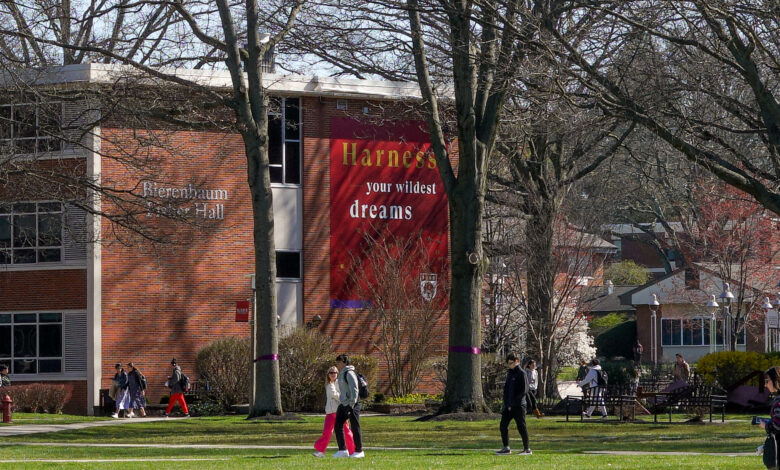
Rider ’s bond rating takes another hit
By Shaun Chornobroff
AS Rider continues its path forward, aiming for a place of financial security, Moody’s Investors Service has continued to question the school’s financial viability.
On April 5, Moody’s, a renowned global risk assessment firm with more than a century of history evaluating organizations, downgraded Rider’s bond rating for the third time since 2020. Rider’s BA3 issuer rating and BA2 revenue bond rating were downgraded to a B2, meaning the university still has a non-investment grade.
Prior to its most recent downgrade, the last hit the university took was in July 2021 and before that in April 2020, when the university’s revenue bonds were downgraded to junk status in the midst of the COVID-19 pandemic.
“The announcement by Moody’s reflects the reality that institutions like Rider University have been facing for years, such as challenging demographics and heightened competition,” Rider’s Associate Vice President for University Marketing and Communications Kristine Brown said in a statement to The Rider News. “These financial concerns were only exacerbated by the pandemic, which unexpectedly drained our financial resources, bringing the situation to a critical point.”
In its explanation, Moody’s said the downgrade was “driven by the university’s multi-year deep deficit of operations and rapidly deteriorating unrestricted liquidity,” adding that negative cash flow will continue through at least the 2025 fiscal year.
Moody’s mentioned that the university had $111 million of outstanding debt as of fiscal year 2022. Rider’s Senior Vice President for Finance and Chief Financial Officer (CFO) James Hartman emphasized that most universities Rider’s size or larger have hundreds of millions of dollars in long-term debt.
Moody’s emphasized that returning to stability in the near future will be a challenge given “the magnitude of projected deficits, the inflammatory environment and projected flat enrollment in fall 2023.”
The drop in rating increases Rider’s difficulty borrowing money, which Hartman said the school has no immediate plans to do so, and the decrease will not have a drastic effect on the university’s operations.
Hartman likened the situation to someone’s personal credit score changing.
“From a day-to-day perspective, rating going down doesn’t change the education we deliver, doesn’t change the services we deliver. We’re going to continue to do the great things we’re doing and trying to even do better as we move forward,” said Hartman.
The CFO explained that he had multiple meetings with Moody’s staff prior to the ratings, which is how the company obtains its statistics.
“We’ve had some significant deficits the last few years, but all that’s driven by the pandemic, and now we’re in a position where we’ve got a plan,” said Hartman. “We’re working on finalizing a plan over the next three years to bring us back to a surplus budget again.”
Since Rider President Gregory Dell’Omo’s term began in 2015, he had a contentious relationship with the school’s faculty union. Rider’s chapter of the American Association of University Professors (AAUP) has twice voted no-confidence, last doing so in February 2022. After contract negotiations over the summer went unresolved, a faculty strike nearly ensued before an eventual agreement on Sept. 11.
In its rationale for Rider’s downgrade, Moody’s said, “Governance considerations are also a key driver to this action,” specifically mentioning management capability, track record, enrollment strategies and the ongoing saga surrounding the potential sale of Rider’s Princeton campus, the former home of Westminster Choir College.
Professors Michael Brogan and Arthur Taylor, who both previously served as AAUP presidents at Rider and are on the union’s negotiating team, said that this downgrade was not surprising, both blaming Dell’Omo’s leadership.
“This entire downgrading from Moody’s is just a stark condemnation of where Rider’s leadership, through the board and through President Dell’Omo, has taken us,” said Taylor, who called Moody’s downgrade a “very serious statement.”
Brogan specifically blamed Dell’Omo’s failed policies for the continuous downgrading of Rider’s bond status.
“The most recent Moody’s report sends a clear message to the board of trustees, all of whom have successful careers in business, that Greg Dell’Omo needs to go” Brogan said via an email to The Rider News. “We need to seriously consider demanding the resignations of all administrators responsible for this situation.”
Since reaching a high with its 2017 freshman enrollment class, the university has seen a steady decline in its student body since. Moody’s said the school has had a 16% decrease in enrollment from fall 2018 to 2022, citing regional demographics, heightened competition and the pandemic as reasons. Moody’s called the factors a “societal consideration” and “driver of this rating action.”
In his interview, Hartman emphasized that the university is seeing a positive increase in its incoming class, a crucial development in the university’s intended journey to financial stability with more than 90% of Rider’s revenue projected to come from “enrollment-related activity” under the university’s business model.
“All the indicators are this is a hot place to be,” said Hartman. “The indicators are showing us that the enrollment is moving up; that’s a key part of the plan.”
Hartman said he has a positive outlook on the university’s financial future and that over the next few years, should things change, he expects the ratings to reflect that.
“A lot of things [are] on the upswing here,” said Hartman. “From Moody’s perspective, they just need to see it happen.”


